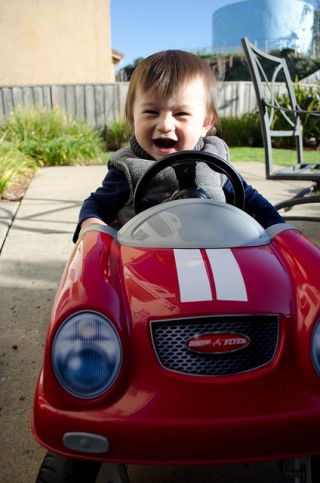

My mom always told me that she hoped that I had a child just like me one day. Part of this was her cursing me because I was every parent’s nightmare as an infant. I cried constantly when I was an infant--when anything in our feeding/napping schedule changed, when I was in a new situation, when I was exposed to a new toy. I was a child with what is called a difficult temperament—a dispositional tendency to be easily overwhelmed and excessively reactive to situations. From all descriptions, I was the poster infant for difficult temperament and I feared that my mother’s wish would come true and I would have a similarly difficult infant.
But part of my mother’s wish that I have a little one like myself came from a very real and sincere hope that I would have a child like myself because after my first year of life, I became a sweet and loving child. I was sensitive to others’ feelings and would go out of my way to try to make someone else feel better. I was the kid who would go up to the new child at school and ask him or her to be my friend. I was the one who would pet my dog and whisper calming words to him during his bath or a vet visit so he wouldn’t be scared. I recognized others' feelings and wanted to make them feel better. In a word, I was empathic.
When I had a child, my mother got her wish, as my daughter was my "mini-me." She screamed for hours each day and everything seemed to upset her—being fed, not being fed, diaper changes, toys, and even her stroller. My pediatrician would look at the dark circles under my eyes and my haggard expression and brightly say “One day this quality in her personality will be a good thing. The same quality that makes her scream for so long will be the reason why she will persevere through difficult times. The characteristic that makes her easily upset will be the same one that makes her easily understand others’ distress. Just wait, this will turn into a good thing.”

I waited (and waited) and eventually my screaming infant turned into a toddler who seems to understand emotions better than most kids. She can look at a picture of a cartoon character and accurately label their emotion. She hugs other kids when they are upset and knows what people are feeling without them saying it.
One day, as I was stressing in the car, furiously rooting through the diaper bag to find cookies for her snack, and trying desperately to make it to an appointment on time, she calmly said “Mommy, chill out!” I looked back at my toddler sitting innocently in her car seat and wondered how it was possible that my toddler recognized that I was stressed and where she learned the term "chill out" or how to apply it so appropriately. My toddler is an emotional and empathic prodigy.
It turns out that my mom and pediatrician were right. Some research shows that kids who were temperamentally difficult become empathic children, who recognize others' emotions and try to help others. It may be that kids who feel negative emotions strongly can also pick up on these negative emotions in others and know what to do to help others to feel better. So the difficult infant becomes the sweet kid who is sensitive to others’ feelings.
But this doesn’t happen in a vacuum. Parents have something to do with this as well. Parents who are warm and caring towards others are more likely to have children who are empathic to others. Kids who feel secure in their relationship with their parent and know that their parent will be there to help them are also more likely to show empathy to others. And empathy has been shown to be somewhat genetically inherited as well--if you are a very empathic person, perhaps your child will be as well. For my little empathic prodigy, I wish the same thing that my mother wished for me—that she one day experiences the joy of having a kid just like her and that her own child reminds her to chill out and enjoy the ride like mine did.

NicoleAbalde
Copyright Amy Przeworski
Follow me on Twitter @AmyPrzeworski https://twitter.com/AmyPrzeworski
Like my Facebook page: https://www.facebook.com/DrAmyP
Follow me on Pinterest: http://pinterest.com/amyp100/
Subscribe to receive emails about new blog posts: http://feeds.feedburner.com/Don039tWorryMom

